Turning Insight Into Action
Breaking: Devastating Advisory Opinion from the Ohio Supreme Court Board of Professional Conduct

We’ve previously covered the topic of Ohio attorney professional ethics relating to House Bill 523 and the coming medical marijuana industry in Ohio. Well, today Ohio lawyers received the much-anticipated advisory opinion from the Board of Professional Conduct and it was…. less than encouraging.
I’m on the road coming back from an oral argument in central Ohio (I pulled over at a McDonald’s to write this, don’t worry), so I’ll hit the bullet points here and provide more in-depth analysis at a later time. Suffice it to say that the Board has chosen to follow the lead of the state’s that have drastically limited (if not outright prohibited) lawyer involvement in the marijuana industry.
From the opinion:
Under Prof.Cond.R. 1.2(d), a lawyer cannot deliver legal services to assist a client in the establishment and operation of a state regulated marijuana enterprise that is illegal under federal law. The types of legal services that cannot be provided under the rule include, but are not limited to, the completion and filing of marijuana license applications, negotiations with regulated individuals and businesses, representation of clients before state regulatory boards responsible for the regulation of medical marijuana, the drafting and negotiating of contracts with vendors for resources or supplies, the drafting of lease agreements for property to be used in the cultivation, processing, or sale of medical marijuana, commercial paper, tax, zoning, corporate entity formation, and statutory agent services. See also, Colo. Op. 125 (2013). Similarly, a lawyer cannot represent a property owner, lessor, supplier or business in transactions with a marijuana regulated entity, if the lawyer knows the transferred property, facilities, goods or supplies will be used to engage in conduct that is illegal under federal law. Even though the completion of any of these services or transactions may be permissible under Ohio law, and a lawyer’s assistance can facilitate their completion, the lawyer ultimately would be assisting the client in engaging in conduct that the lawyer knows to be illegal under federal law.
However, there is a range of conduct that the Board has deemed to be permitted:
[The current Rule] permits a lawyer to explain to the client the conflict that currently exists between state and federal law, the consequences of engaging in conduct that is permissible under Ohio law but contrary to federal law, and the likelihood of federal enforcement given the policies of the current administration. A lawyer may counsel and advise a client regarding the scope and general requirements of the Ohio medical marijuana law, the meaning of its provisions, and how the law would be applied to a client’s proposed conduct. A lawyer also can advise a client concerning good faith arguments regarding the validity of the federal or state law and its application to the client’s proposed conduct.
In addition to the permissible range of advice permitted under Prof.Cond.R. 1.2(d), the rule does not preclude a lawyer from representing a client charged with violating the state medical marijuana law, representing a professional license holder before state licensing boards, representing an employee in a wrongful discharge action due to medical marijuana use, or aiding a government client in the implementation and administration of the state’s regulated licensing program. With regard to the latter, lawyers assisting a government client at the state or local level in the establishment, operation, or implementation of the state medical marijuana regulatory system are not advising or assisting the client in conduct that directly violates federal law. The state or a local government is not directly involved in the sale, processing, or dispensing of medical marijuana prohibited by federal law, even though it is arguably enabling the conduct through the issuance of licenses and the maintenance of its regulatory system.
It appears, therefore, that until the Ohio Supreme Court amends the Rules of Professional Conduct Ohio marijuana businesses will be forced to operate without many of the kinds of professional legal advice that lawyers provide to clients in other industries. This result is simply untenable over the long term, given the regulated nature of the industry and the need for competent legal counsel.
I will follow up with an update on the course forward for Ohio lawyers and their clients in the medical marijuana industry.
A link to the full opinion can be found by clicking here.